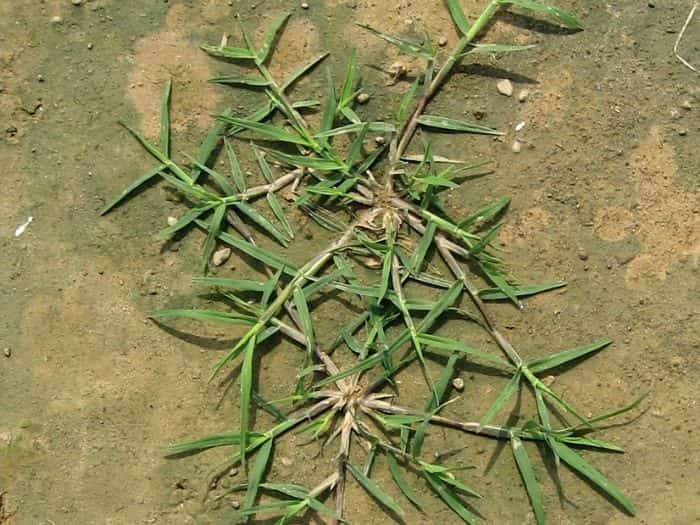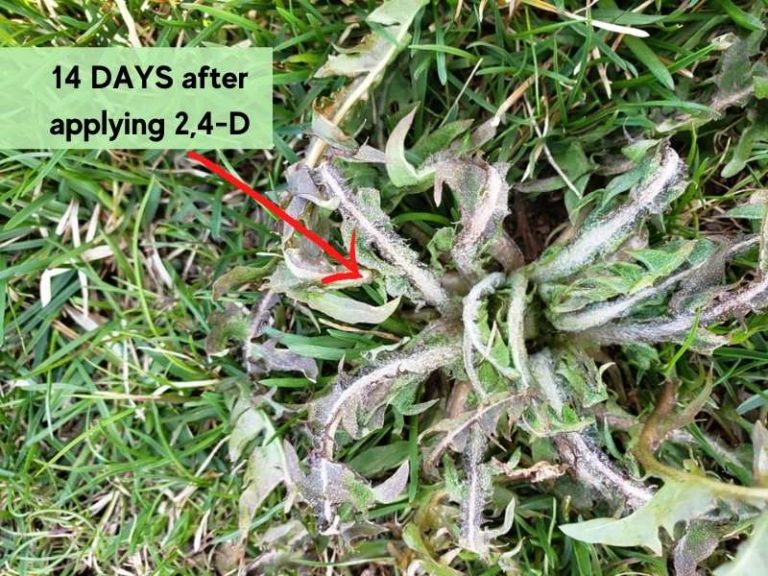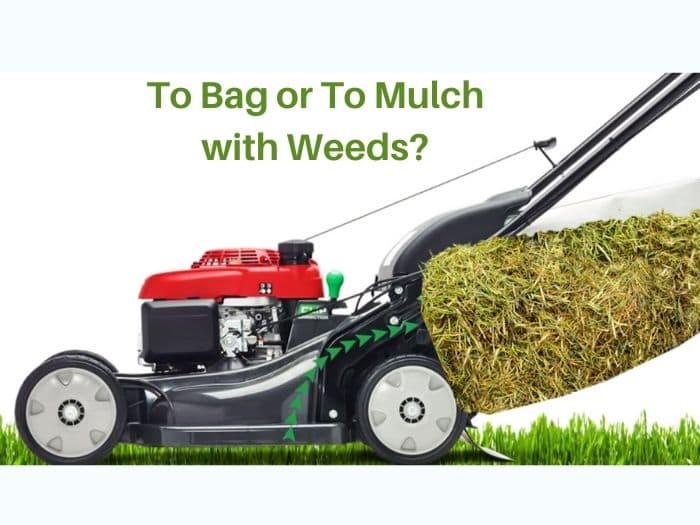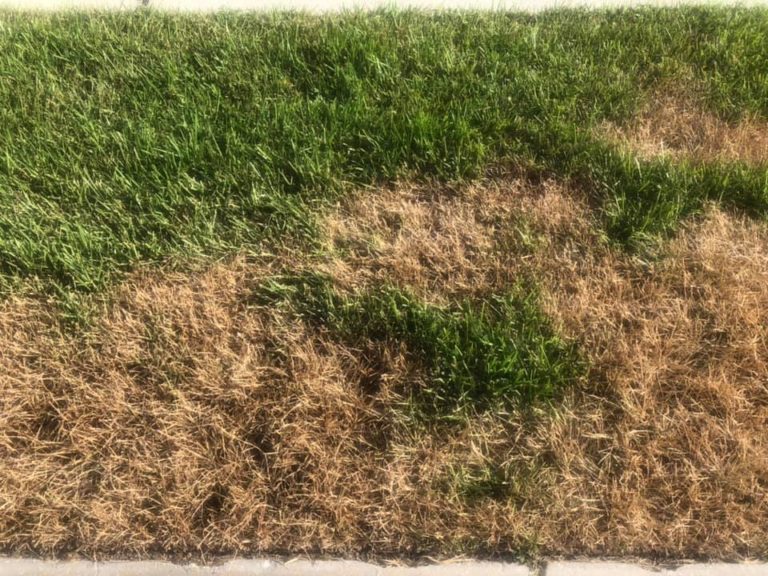Bermuda Grass Killer – 7 Best Herbicides that Get Rid of Bermuda Grass
Common Bermuda grass is an aggressive weed in lawns and flower beds. It grows and spreads quickly, taking over lawns and flower beds. The best way to get rid of Bermuda grass is to use a good Bermuda grass killer.
There are two types of Bermuda grass killers to choose from depending on the invasion:
- Selective herbicides: These target and kill the weed without killing the desired grass in the lawn. A reliable Bermuda grass selective herbicide is Ornamec 170 Herbicide.
- Non-selective herbicides: These herbicides target any vegetation, meaning they can kill even the turfgrass and flowers where they’re applied. An effective Bermuda grass killer here is Roundup (glyphosate) but I’d recommend you spot-treat to prevent damage to your turfgrass.

Best Bermuda Grass Killers that Work
A few products I’ve tested on the market can actually knock down common Bermuda grass weed in lawns with St. Augustine, Zoysia, KBG, fescue, and other turfgrasses. Here are the top 5 Bermuda grass killers that work:
| Herbicide | Name + Brand | Features | My Rating | Reviews |
|---|---|---|---|---|
1. Ornamec Over The Top Grass |
|
|||
2. Bio-Advanced 704100B |
||||
3. Compare-N-Save 016869 Concentrate |
|
|||
4. Fertilome Over The Top Grass Killer |
|
|||
5. Fusilade II Turf and Ornamental |
|
1. Ornamec Over The Top Grass Herbicide
- Proven to kill Bermuda grass
- Gets rid of other tough grassy weeds
- Systemic – kills to the root
- Works fast – results in 7 days
- Rainfast in 1 hour
Onamec works – especially if you follow instructions. It is actually the best selective Bermuda grass killer of all the herbicides I’ve used and reviewed.
Ornamec Over The Top does not kill grass in specified lawns, ground covers, and gardens. The formulation is powerful enough and can get rid of even more tough-to-kill grassy weeds, including crabgrass, quackgrass, dallisgrass, and goosegrass.
Being a systemic selective herbicide, it is great (and safe) for killing Bermuda grass in turfgrasses such as Zoysiagrass and Tall Fescue.
Note: If your lawn (especially fescue) is under stress, such as drought or disease, do not apply Ornamec Over The Top, as it has shown negative effects on lawns with such problems.
There are two versions of this product – PBI Gordon’s Ornamec (concentrate only) and Ornamec 170 (premixed with a surfactant). I prefer concentrating without surfactant because I can still use my general herbicide surfactant to get the job done.
2. Bio-Advanced 704100B Bermudagrass Control for Lawns
- Effective selective Bermuda grass killer
- Won’t kill desired grass in intended lawns
- Is also a good crabgrass killer
- Can be used in flower beds and ornamental grasses
If you’re looking for a way to kill Bermuda grass without killing grass in your lawn (desirable grass), the best selective herbicide is BioAdvanced Bermudagrass Control.
This Bermuda grass selective herbicide is safe for use on cool-season turfgrasses such as perennial rye, Kentucky bluegrass, and fescues, so you won’t harm desirable grass.
What I liked most about BioAdvanced Bermuda Grass Control is that it’s also effective at killing other tough-to-control grassy weeds such as crabgrass – all the way to the root.
The one I bought and tested is the ready-to-spray bottle, so I just connected it to a hose went on to spray it on my lawn in areas where there was common Bermuda grass invasion.
Caution: BioAdvanced selective Bermuda grass killer is not safe to use on St. Augustine grass, Bermudagrass, Centipede, Bentgrass, zoysia, or Bahia lawns. You may notice a little discoloration on KBG, but it will only be temporary, and the grass will green up quickly.
You can safely use Bayer Bermuda grass control around ornamental trees, shrubs, and trees because it will not harm them.
Other weeds controlled include foxtail, sandbur, crabgrass, and Japanese stilt grass.
3. Compare-N-Save 016869 Concentrate Grass and Weed Killer
- Kills Bermuda grass to the root
- All-purpose weed killer for yards
- Has no residual effect
- Controls both grassy + broadleaf weeds in lawns
With 41% glyphosate, Compare N Save is one of the best weed killers for lawns that guarantees to kill tough-to-control Bermuda grass and other weeds to the root.
It is one of my go-to formulations when I have small instances of Bermuda grass that I’d like to spot-treat and get rid of in the lawn. For better use, spot-treat the stubborn weeds (including crabgrass) to prevent damage to desired turfgrass and other vegetation.
Pro tip: Cover the surrounding lawn grass with aluminum foil or cardboard to prevent contact with glyphosate.
You may need to make repeat applications to kill tough weeds especially common Bermuda grass,
4. Fertilome Over The Top Grass Killer
- Fast-acting – kills weeds in 2 days
- Has Sethoxydim, a selective Bermuda grass killer
- Systemic herbicide – kills grassy weeds to the root
- Also controls crabgrass and other tough grassy weeds
- Only safe on centipede grass
Over The Top has a reputation for killing tough grassy weeds with just one application. When I tried it on a patch of Bermuda grass in my lawn, the herbicide did not fall short of its reputation.
I applied to a patch of overgrown Bermuda grass (over 1 foot high), and the results started showing within two days with the weed discoloring, wilting, and dying off.
As per the label, Fertilome Over The Top Grass killer controls not only common Bermuda grass but also crabgrass, foxtail, barnyard grass, goosegrass, quackgrass, orchard grass, etc. It can control both annual and perennial grasses that are typically hard to kill.
Although this is a selective herbicide for controlling Bermuda grass weed, I would recommend you spot-treat, especially if you’re not sure whether your turfgrass is tolerant to the active ingredient.
The downside of Fertilome Over The Top Weed Killer is that it is generally great if you’re spot-treating grassy weeds in your lawn. Although it is a selective herbicide, it can cause injury to your lawn.
I would highly recommend it for controlling Bermuda grass weeds in garden beds and other areas where you’re growing broad-leafed crops such as vegetables, fruit, field, and ornamental crops.
5. Fusilade II Turf and Ornamental Herbicide
- Proven to kill Bermuda grass weed within 21 days
- Selective herbicide – safe on turfgrass
- Destroys many grassy weeds, including crabgrass
- Safe for use on tall fescue and zoysia lawns
- Works best and fast with a surfactant
Although Fusilade II took about 9 days to start working, it killed all the Bermuda grass I was targeting along the edges of my lawn (the weed was damaging the straight lawn edge I had struggled to maintain).
The results started to show after 9 days – yellowing of foliage, stunted growth, and general weakening of the Bermuda grass shoots. Complete death of the weed occurred after around 21 days.
The active ingredient in Fusilade II is Fluazifop-p-butyl, a selective herbicide used as a post-emergent to control many annual and perennial grass weeds.
This herbicide is great for controlling grassy weeds in lawns and in ornamental grasses, flower beds, golf-course turfs, driveways, and other landscaping areas.
Tip: For the best results, use Fusilade II with a non-ionic surfactant. It will help the herbicide stick onto the foliage and kill Bermuda grass faster. The best surfactant to use is the Southern Ag Nonionic Surfactant, which works by increasing the penetration, coverage, and overall effectiveness of the herbicide.
This weed killer is safe for use on common Bermuda grass weeds in tall fescue and zoysia. Do not apply on fescue lawns in the summer.
6. Roundup Extended Control Weed and Grass Killer
- Kills Bermuda grass to the root
- Fast-acting – results start in just 6 hours
- Great for lawn edges, sidewalks, driveways, fences
- Pre and post-emergent for all weeds
Roundup is one of the few herbicides on the market today that can guarantee completely eliminating Bermuda grass. While it is not a selective herbicide, it can kill the stubborm common Bermudagrass weed to the root. That means it will kill both rhizomes and stolons running underground and above ground.
I use roundup to control Bermuda grass weed along fences, driveways, patios, and sometimes on the edges of lawns where there’s an overgrowth of Bermuda grass. It also prevents weeds from growing for up to 4 months.
Caution: Roundup is not a selective herbicide. It will kill all vegetation it comes into contact with. Do not apply on your desired turfgrass.
7. BASF Pylex Herbicide
- Gets rid of Bermuda grass rhizomes and stolons
- Safe for most cool season lawns
- Also gets rid of crabgrass
Pylex is a systemic herbicide that acts as a selective post-emergent safe for sine cool-season turfs. It is absorbed through roots, shoots, and leaves, making it a potent weed killer for Bermuda grass.
The best use for this herbicide is either spot application in lawns or broadcast spray on driveways, fences, sod farms, and golf-course edges.
Caution: Do not apply Pylex Herbicide on Bahiagrass, St. Augustine grass, Buffalograss, zoysia, carpetgrass, and Dichondra.
Other Ways to Get Rid of Bermuda Grass
Keep in mind that lawns with extensive Bermuda grass weed invasion may take a long time to get rid of the pest permanently. Even vinegar-based sprays and many organic weed killers may show temporary suppression, but the weed will thrive again.
In such instances, you might want to cultivate the yard, destroy Bermuda grass with a potent herbicide such as Roundup, and then re-establish the lawn afresh.
Here’s how to get rid of Bermuda grass weeds other than using herbicides:
Choke Bermuda grass out
Maintaining your lawn the right way can help get rid of Bermuda grass weed. One best way to do that is to mow your lawn higher (3 to 3 ½ inches high) while the weed is still young or just sprouting.
A thick turf deprives Bermuda grass of light and competes for nutrients, thus limiting the growth rate of weeds and helping control them in the end.
While cutting grass high can help choke out grassy and broadleaf weeds, proper fertilization and watering of your turfgrass will improve growth and help keep Bermuda grass out of your lawn.
Mulching flower beds
Mulching is a natural way of getting rid of Bermuda grass in flower beds because it prevents the weed from getting sunlight, forcing it to die. The best type of mulch to use for Bermuda grass is black polyethylene. When applied over Bermudagrass in the summer and left for 6 to 8 weeks, it can kill the plant completely.
Do not use wood chips as mulch in your flowerbeds because Bermuda grass can push through the chips and survive. An exception is when you’re using an organic landscape fabric under the wood chip mulch.
Solarization
Solarization means covering the weed with a transparent tarp that helps trap heat from the sun to help dessicate the weed.
To kill Bermuda grass by solarization, cover it with a clear plastic and bury the edges well enough to trap all the heat underneath. Leave the plastic over the Bermuda grass for at least 4 weeks during hot, sunny months to completely eliminate the weed.
This method is highly effective at killing mature Bermuda grass weeds and their seeds during the hot months of summer – June, July, and August.
Deep edging
If the problem is mainly Bermuda grass rhizomes and stolons spreading into flower beds, edging might be the best solution as opposed to chemical control.
Apart from the usual edging of your lawn, the best control is to use edging material that goes six inches into the soil. This will separate flower beds from lawn areas where Bermuda grass is a desirable turfgrass.
Resources + References:
- Syngenta Fusilade Bermuda Grass Killer Label
- Cooperative Extension Offices of Cornell University: Fluazifop-p-butyl Herbicide Profile
- Mitchelle Le Strange, University of California, Master Gardener Newspaper: Getting Rid of Bermuda Grass
- University of Arkansas, Division of Agriculture Extension: Can Bermuda Grass Be Killed?
- Bioadvanced – Product Label




![Killing Crabgrass With Baking Soda [Homemade Killer With Pictures]](https://lawnmodel.com/wp-content/uploads/2020/11/Baking-soda-crabgrass-killer-homemade-768x546.jpg)
